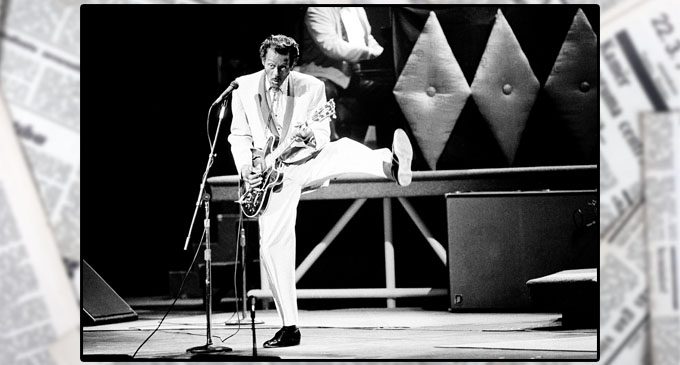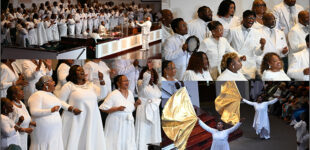Rock ‘n’ roll legend Chuck Berry dies at 90
Chuck Berry performs during a concert celebration for his 60th birthday at the Fox Theatre in St. Louis, Mo., Oct. 17, 1986. The concert is being filmed for a motion picture documentary titled "Chuck Berry Hail! Hail! Rock 'n' Roll."

AP Photo/James A. Finley
BY HILLEL ITALIE AND JIM SUHR
ASSOCIATED PRESS
NEW YORK —Chuck Berry, rock `n’ roll’s founding guitar hero and storyteller who defined the music’s joy and rebellion in such classics as “Johnny B. Goode,” “Sweet Little Sixteen” and “Roll Over Beethoven,” died Saturday, March 18, at his home west of St. Louis. He was 90.
Emergency responders summoned to Berry’s residence by his caretaker about 12:40 p.m. found him unresponsive, police in Missouri’s St. Charles County said in a statement. Attempts to revive Berry failed, and he was pronounced dead shortly before 1:30 p.m., police said.
Berry’s core repertoire was some three dozen songs, his influence incalculable, from the Beatles and the Rolling Stones to virtually any group from garage band to arena act that called itself rock `n roll.
While Elvis Presley gave rock its libidinous, hip-shaking image, Berry was the auteur, setting the template for a new sound and way of life.
“Chuck Berry was a rock and roll original. A gifted guitar player, an amazing live performer, and a skilled songwriter whose music and lyrics captured the essence of 1950s teenage life,” The Rock & Roll Hall of Fame said in a statement.
Well before the rise of Bob Dylan, Berry wedded social commentary to the beat and rush of popular music.
“He was singing good lyrics, and intelligent lyrics, in the `50s when people were singing, “Oh, baby, I love you so,”’ John Lennon once observed.
Berry, in his late 20s before his first major hit, crafted lyrics that spoke to the teenagers of the day and remained fresh decades later. “Sweet Little Sixteen” captured rock `n’ roll fandom, an early and innocent ode to the young girls later known as “groupies.” “School Day” told of the sing-song trials of the classroom (”American history and practical math; you’re studying hard, hoping to pass…”) and the liberation of rock `n’ roll once the day’s final bell rang.
“Roll Over Beethoven” was an anthem to rock’s history-making power, while “Rock and Roll Music” was a guidebook for all bands that followed (”It’s got a back beat, you can’t lose it”). “Back in the U.S.A.” was a black man’s straight-faced tribute to his country at a time there was no guarantee Berry would be served at the drive-ins and corner cafes he was celebrating.
“Everything I wrote about wasn’t about me, but about the people listening,” he once said.
“Johnny B. Goode,” the tale of a guitar-playing country boy whose mother tells him he’ll be a star, was Berry’s signature song, the archetypal narrative for would-be rockers and among the most ecstatic recordings in the music’s history. Berry can hardly contain himself as the words hurry out
When NASA launched the unmanned Voyager I in 1977, an album was stored on the craft that would explain music on Earth to extraterrestrials. The one rock song included was “Johnny B. Goode.”
Charles Edward Anderson Berry was born in St. Louis on Oct. 18, 1926. As a child he practiced a bent-leg stride that enabled him to slip under tables, a prelude to the duck walk of his adult years. His mother, like Johnny B. Goode’s, told him he would make it, and make it big.
A fan of blues, swing and boogie woogie, Berry studied the very mechanics of music and how it was transmitted. As a teenager, he loved to take radios apart and put them back together. Using a Nick Manoloff guitar chord book, he learned how to play the hits of the time. He was fascinated by chord progressions and rhythms, discovering that many songs borrowed heavily from the Gershwins’ “I Got Rhythm.”
He began his musical career at age 15 when he went on stage at a high school review to do his own version of Jay McShann’s “Confessin’ the Blues.” Berry would never forget the ovation he received.
“Long did the encouragement of that performance assist me in programming my songs and even their delivery while performing,” he wrote in his autobiography. “I added and deleted according to the audiences’ response to different gestures, and chose songs to build an act that would constantly stimulate my audience.”
In 1948, Berry met and married Themetta Suggs, who stayed by his side despite some of his well-publicized indiscretions.
Berry also appeared in a dozen movies, doing his distinctive bent-legged “duck-walk” in several teen exploitation flicks of the ’50s.
Berry lived through several bouts with the law over the decades but served three years or less at a time, and he had legal battles with Johnnie Johnson, a boogie-woogie piano master who collaborated on many Berry hits, and others over his music.
“Every 15 years, in fact, it seems I make a big mistake,” Berry acknowledged in his memoir.
His hit-making days were essentially over in the early 1960s after he served 1 1/2 years of a three-year term for transportation of a minor across state lines for “immoral purposes.”
But on his 90th birthday last year, Berry dis-closed that he would release his first new album in 38 years in 2017, titled simply: “Chuck.” The announcement said it would be comprised primarily of new, original songs written, recorded and produced by him.
Jim Suhr reported from Kansas City, Missouri.















